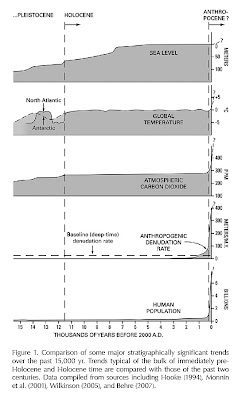New geological ages are characterized by changes in global environmental conditions and large scale shifts in types of species. Recently Earth has entered into a new geological age: The Anthropocene, from anthropo / man and cene / new [geological age]. Humans are now changing the world on a global scale and ushering in the new era in geologic time.
– Oceanography in the 21st Century
It has no precise start date, but may be considered to start in the late 18th century when the activities of humans first began to have a significant global impact on the Earth’s climate and ecosystems. This date coincides with James Watt‘s invention of the steam engine in 1784. The term was coined in 2000 by the Nobel Prize winning atmospheric chemist Paul Crutzen, (who unpacked the process of atmospheric ozone depletion) who regards the influence of human behavior on the Earth in recent centuries as so significant as to constitute a new geological era.
– Wikipedia
Geologists from the University of Leicester propose that humankind has so altered the Earth that it has brought about an end to one epoch of Earth’s history and marked the start of a new epoch – the Anthropocene.
They have identified human impact through phenomena such as:
• Transformed patterns of sediment erosion and deposition worldwide
• Major disturbances to the carbon cycle and global temperature
• Wholesale changes to the world’s plants and animals
• Ocean acidification
The scientists analysed a proposal made by Nobel Prize-winning chemist Paul Crutzen in 2002. He suggested the Earth had left the Holocene and started the Anthropocene era because of the global environmental effects of increased human population and economic development.
The researchers argue that the dominance of humans has so physically changed Earth that there is increasingly less justification for linking pre- and post-industrialized Earth within the same epoch – the Holocene.
– from Paleoblog
